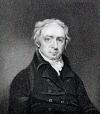_Scene_--SOUTH AMERICA.
_Characters._--Valdivia, commander of the Spanish armies--Lautaro, his
page, a native of Chili--Anselmo, the missionary--Indiana, his adopted
daughter, wife of Lautaro--Zarinel, the wandering minstrel.
_Indians._--Attacapac, father of Lautaro--Olola, his daughter, sister of
Lautaro--Caupolican, chief of the Indians--Indian warriors.
The chief event of the poem turns upon the conduct of Lautaro; but as
the Missionary acts so distinguished a part, and as the whole of the
moral depends upon him, it was thought better to retain the title which
was originally given to the poem.
Dedicated to the Marquis of Lansdowne.
When o'er the Atlantic wild, rocked by the blast,
Sad Lusitania's exiled sovereign passed,
Reft of her pomp, from her paternal throne
Cast forth, and wandering to a clime unknown,
To seek a refuge on that distant shore,
That once her country's legions dyed with gore;--
Sudden, methought, high towering o'er the flood,
Hesperian world! thy mighty genius stood;
Where spread, from cape to cape, from bay to bay,
Serenely blue, the vast Pacific lay;
And the huge Cordilleras to the skies
With all their burning summits seemed to rise.
Then the stern spirit spoke, and to his voice
The waves and woods replied:--Mountains, rejoice!
Thou solitary sea, whose billows sweep
The margin of my forests, dark and deep,
Rejoice! the hour is come: the mortal blow,
That smote the golden shrines of Mexico,
In Europe is avenged; and thou, proud Spain,
Now hostile hosts insult thy own domain;
Now Fate, vindictive, rolls, with refluent flood,
Back on thy shores the tide of human blood,
Think of my murdered millions! of the cries
That once I heard from all my kingdoms rise;
Of Famine's feeble plaint, of Slavery's tear;--
Think, too, if Valour, Freedom, Fame, be dear,
How my Antarctic sons, undaunted, stood,
Exacting groan for groan, and blood for blood;
And shouted, (may the sounds be hailed by thee!)
Tyrants, the virtuous and the brave are free!






